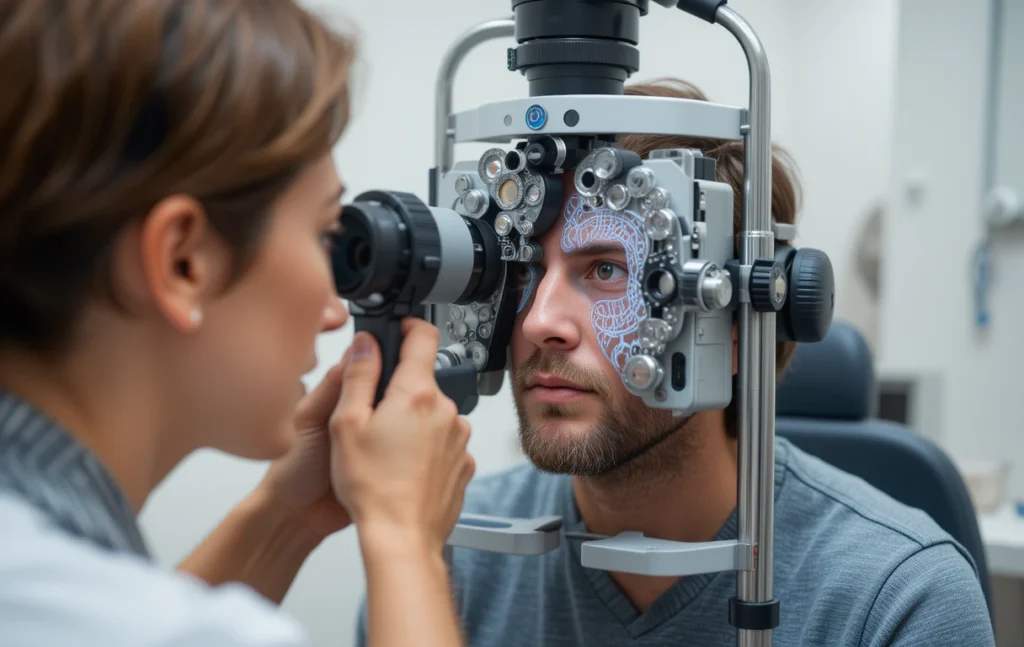
Cataract surgery is one of the most common and effective procedures to restore clear vision. If you or a loved one is facing cataracts, you might wonder, “Can you have cataract surgery more than once on the same eye?” This question often pops up because of myths or confusion about vision changes after surgery. In this article, we’ll use expert quotes from real interviews to explain the answer in simple terms. We’ll also cover related topics like posterior capsule opacification (PCO), recovery tips, and what to expect. Our goal is to make this easy to understand, helpful, and packed with facts for anyone curious about cataracts.
What Are Cataracts and How Does Surgery Work?
Cataracts happen when the eye’s natural lens becomes cloudy, causing blurry vision, glare, or trouble seeing at night. Cataract surgery removes this cloudy lens and replaces it with an artificial intraocular lens (IOL). This new lens is permanent and cannot develop cataracts. But can you need surgery again on the same eye? Let’s dive into what experts say.
Dr. Ben Wilkinson, FRCSC, Ophthalmologist, explains, “Yes, but once the lens (cataract) has been removed, it cannot be removed again! Cataract is no more a virus infection or a disease than skin wrinkles. Like skin, it progressively ages, but unlike skin it cannot be repeatedly removed.” This makes it clear: cataract surgery is a one-time procedure per eye because the natural lens is gone for good.
Can You Have Cataract Surgery More Than Once?
The short answer is no, you cannot have traditional cataract surgery more than once on the same eye. Since the cloudy lens is replaced with an artificial one, cataracts cannot grow back. However, some people experience vision problems after surgery that feel like cataracts returning. This is often due to a condition called posterior capsule opacification (PCO), sometimes mislabeled as a “secondary cataract.”
Schwartz Laser Eye Center clarifies, “No, cataracts cannot come back after surgery. The artificial intraocular lens cannot grow a cataract. However, after surgery, the lens capsule may become cloudy. This can lead to blurry vision, creating symptoms similar to cataracts. This condition is sometimes called a ‘secondary cataract.’ It is actually posterior capsular opacification.”
Dr. Danny Lee, MD, Laser Eye Center, adds, “Posterior capsule opacity (PCO) can happen after cataract surgery when the thin membrane around the IOL gets cloudy or hazy and blocks light. Your eye doctor can quickly correct PCO with a five-minute procedure called a YAG laser capsulotomy.” This laser treatment is not surgery but a quick, painless fix done in the doctor’s office.
Why Does PCO Happen?
After cataract surgery, the lens capsule (a thin membrane that holds the IOL) can sometimes become cloudy. This happens in about 10-20% of patients within a few years of surgery. PCO causes symptoms like blurry vision or glare, which can feel like cataracts coming back. The good news? A YAG laser capsulotomy clears the cloudiness in minutes, and you only need it once.
Cataract Surgery for Both Eyes
If you have cataracts in both eyes, surgery is usually done one eye at a time. Dr. Amber Hoang, MD, Corneal Specialist at Duke Health, explains, “If you have cataracts in both eyes, surgery is performed on the most severely affected eye first. One to two weeks later, you can have surgery on your other eye. This allows the first eye to recover and your vision in that eye to stabilize before surgery on your other eye.”
Dr. Laura Fine, Cataract Specialist at Harvard Medical School, adds, “Most cataracts progress very slowly and can be safely observed until you feel you need better vision — for example, if you have difficulty reading or seeing street signs. Typically, people have surgery in the eye with the denser cataract first. If the other eye has only a minimal cataract, a second eye surgery may not be needed for years.” This staggered approach ensures better recovery and reduces risks.
What to Expect After Cataract Surgery
Cataract surgery is highly successful, with over 95% of patients experiencing improved vision. Dr. Allen Eghrari, Ophthalmologist at Johns Hopkins Medicine, shares, “Your world often looks brighter after cataract surgery. You may find that sunglasses or a dedicated set of driving glasses can help to moderate the light entering the eye from bright headlights.” This brighter vision is a common benefit, but it may take time to adjust.
Here’s a quick look at what happens after surgery:
| Aspect | Details |
|---|---|
| Recovery Time | Most patients resume normal activities within a few days. Full recovery takes 4–6 weeks. |
| Vision Changes | Colors may look brighter, and vision becomes sharper. Some need glasses for fine-tuning. |
| Follow-Up Care | Regular checkups to monitor healing and check for PCO or other issues. |
| PCO Treatment | YAG laser capsulotomy if cloudy vision occurs (quick, outpatient procedure). |
Tips for a Smooth Recovery
To make the most of your cataract surgery, follow these tips:
- Use prescribed eye drops: These prevent infection and reduce swelling.
- Avoid rubbing your eyes: This protects the healing eye.
- Wear sunglasses: Bright light can be intense post-surgery, as Dr. Eghrari noted.
- Attend follow-up visits: Your doctor will check for complications like PCO.
- Rest and relax: Give your eyes time to heal by avoiding heavy lifting or strenuous activities.
Who Needs Cataract Surgery?
Cataracts often develop with age, but injury, diabetes, or certain medications can speed them up. You may need surgery if you experience:
- Blurry or foggy vision
- Trouble seeing at night
- Sensitivity to glare or bright lights
- Fading colors
- Double vision in one eye
Talk to your eye doctor if these symptoms affect daily tasks like driving or reading. They’ll assess whether surgery is right for you.
Why Trust Expert Insights?
The quotes in this article come from trusted ophthalmologists and eye care centers, ensuring you get accurate information. Whether it’s Dr. Wilkinson explaining why cataracts can’t return or Dr. Lee detailing PCO treatment, these experts provide clarity on a complex topic. Their insights help debunk myths and guide patients toward informed decisions.
FAQs About Cataract Surgery
Q: Can cataracts grow back after surgery?
A: No, cataracts cannot grow back because the natural lens is replaced with an artificial one. However, posterior capsule opacification (PCO) can cause similar symptoms, treated with a YAG laser.
Q: Is cataract surgery painful?
A: No, the procedure is done under local anesthesia, so you won’t feel pain. You may feel slight discomfort during recovery.
Q: How long does it take to recover from cataract surgery?
A: Most people resume normal activities within a few days, with full recovery in 4–6 weeks.
Q: What is a YAG laser capsulotomy?
A: It’s a quick, outpatient procedure to clear cloudy vision caused by PCO. It takes about five minutes and doesn’t require surgery.
Q: Can I have cataract surgery on both eyes at once?
A: Usually, no. Doctors perform surgery on one eye first, then the other after a week or two, as Dr. Hoang explains.
See Clearly with Confidence: Your Next Steps
Cataract surgery is a one-time fix for each eye, as the artificial lens cannot develop cataracts. If blurry vision returns, it’s likely posterior capsule opacification, which is easily treated with a laser. Experts like Dr. Wilkinson, Dr. Hoang, Dr. Fine, Dr. Eghrari, and Dr. Lee emphasize the procedure’s safety and effectiveness. By understanding the facts, you can approach cataract surgery with confidence. If you’re experiencing vision changes or have questions, reach out to an eye care specialist for personalized advice.
Disclaimer: This article is for informational purposes only and does not constitute medical advice. Always consult a qualified ophthalmologist or healthcare professional for diagnosis, treatment, or medical decisions related to cataracts or eye health.


